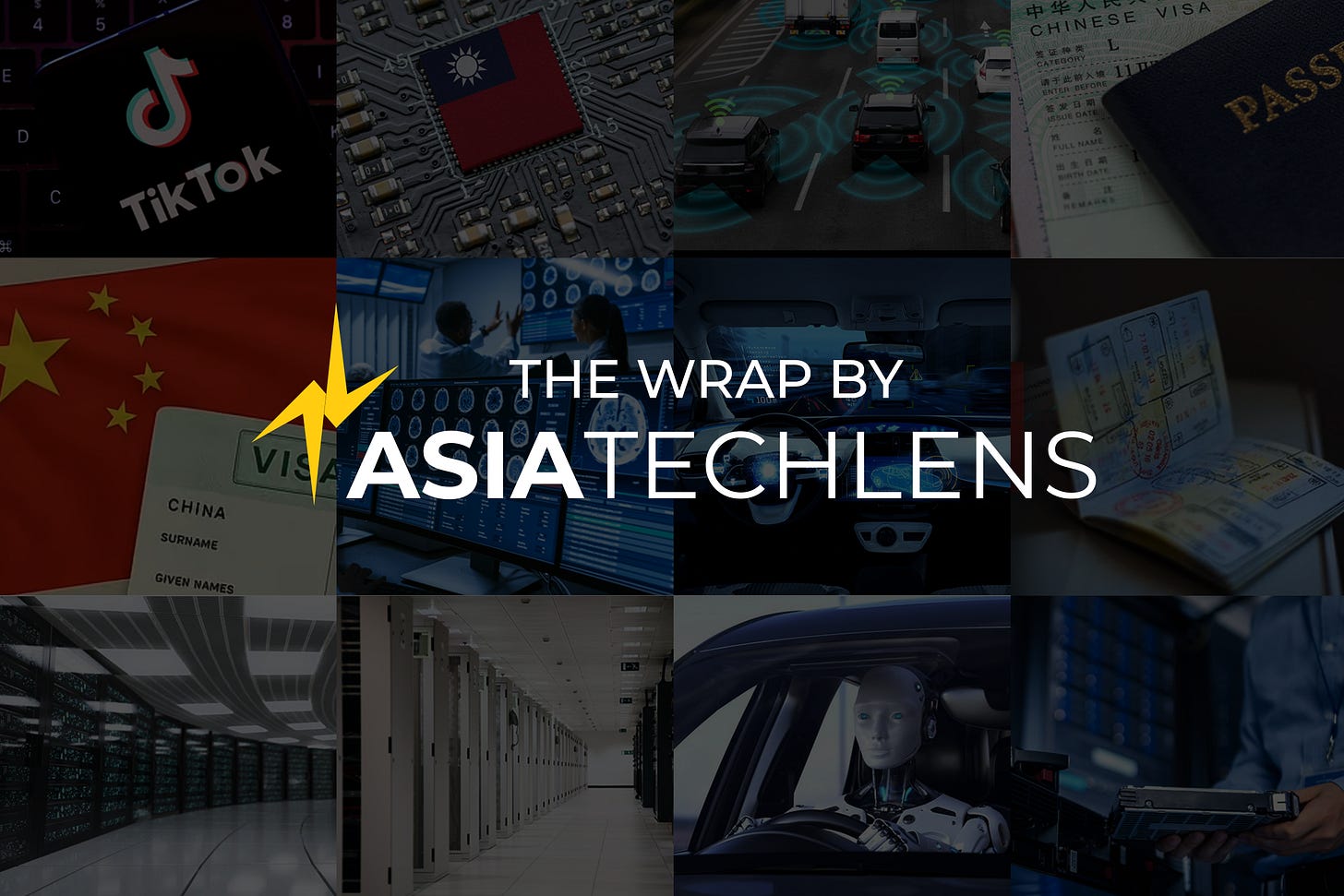The Wrap | 11 Oct - 17 Oct 2025
Asia Tech Lens’ weekly digest: news, context, and signals shaping Asia’s tech future
Editor’s Note: Welcome back to The Wrap by Asia Tech Lens, our weekly digest of the signals, shifts, and stories shaping Asia’s tech future.
Each Friday, we highlight the week’s most important developments, with the context and bottom lines that matter. Whether it’s chips, AI, mobility, or education, our goal is to connect the dots across Asia’s fast-changing tech landscape.
We’d love to hear your feedback as we refine this series; reply directly or drop us a note on LinkedIn.
Data Centers | India
Google Bets Big on India
Google will invest $15 billion over five years in India’s Andhra Pradesh to build its largest AI data center outside the US. India has emerged as a key destination for AI data centers: low data costs and a rapidly growing internet user base have made it a hub for cloud and AI expansion. The project will combine cloud and AI infrastructure with renewable energy systems and an expanded fiber-optic network.
Bottom Line: Despite US “invest at home” rhetoric, global scale and proximity to growth still matters most for Big Tech.
Semiconductors | Taiwan
TSMC Profits Surge; Hit Another Record
Taiwan Semiconductor Manufacturing Company (TSMC), the world’s largest contract chipmaker, rode the AI boom to a fresh record, with third-quarter profit up 39.1% year on year. Revenue hit NT$989.92bn (US$32.26bn), and net profit reached NT$452.3bn (US$14.74bn), both record highs, as AI/HPC orders from clients like Nvidia and AMD kept advanced nodes running hot
Bottom Line: Tariffs are a risk, but Taiwan’s push for reciprocal rates and likely TSMC exemptions should keep momentum intact.
Quick Commerce | India
Zepto secures $450 Million in Funding; Rides the Quick Commerce Boom
India’s quick commerce player Zepto raised $450 million in a pre-IPO round led by CalPERS, lifting its valuation to $7 billion. CEO Aadit Palicha says the company now holds about $900 million in net cash, handles roughly 1.7 million orders a day, and will add a few hundred new dark stores over the next year. He also expects domestic ownership to climb from 12% to 40% ahead of the IPO. Zepto competes in a hyper-competitive, low-margin segment by promising 10-minute grocery deliveries.
Bottom Line: Flush with cash, Zepto looks IPO-ready, but India’s quick commerce market is a crowded dogfight where execution and margins decide who lasts.
Biotech | Singapore
Singapore’s Nanyang Biologics to Make Its Nasdaq Move
Nanyang Biologics is set for a $1.5 billion Nasdaq listing via SPAC, underscoring Southeast Asia’s role in AI-driven drug discovery and and biologics manufacturing. Nanyang Biologic’s latest initiative reflects its efforts to have its early-stage drug assets licensed to US manufacturers. The deal will also test US investor appetite for SEA biotech and could broaden capital-market pathways for the region’s health-tech startup.
Bottom Line: The SPAC merger fits pharma’s AI pivot, where data-driven models are speeding drug discovery and trimming R&D costs.
Fintech | Philippines
Filipino-led Ryder Lands $3.2m For ‘Seedless’ Crypto Wallet
Ryder, a Philippine startup, has landed $3.2 million in seed funding from top investors including Tim Draper, Solana’s Anatoly Yakovenko. The startup’s new crypto wallet aims to make digital assets safer and easier for ordinary users, with a tap-based recovery feature that removes the need for complex seed phrases such as “12-word recovery passwords” or “backup codes”. Ryder plans to use the funds to expand its team and grow its presence globally.
Bottom Line: Ryder is turning crypto from geeky to easy, helping more Filipinos secure their digital assets with a simple tap.
Consumer Tech | China
Honor Teases ‘Robot Phone’ Blending AI & Robotics
In a reveal that looks straight out of Disney-Pixar’s WALL·E, Chinese smartphone maker Honor announced a “Robot Phone” concept: a tiny robotic camera arm that folds out from the back and works like a gimbal, blending mechanical movement with AI control. More details expected at Mobile World Congress next year. The company is pitching this as an “emotional companion” that can sense and adapt to your needs as part of its broader AI push.
Bottom Line: This signals Honor’s bigger AI push, but the test is whether the “Robot Phone” becomes a pillar of its device-plus-agent (where phones act as semi-autonomous assistants) strategy or fades as a one-off stunt.
Signal To Watch:
If Google breaks ground on India’s AI hub, expect more global cloud investment to follow.
If TSMC bypasses tariffs, Taiwan’s chip lead holds.
If Ryder’s wallet sees strong uptake, user-friendly crypto could scale in Southeast Asia.
Fun, headline-grabbing concept, but until Honor shows real hardware beyond CGI, it remain nothing more than marketing theater.


